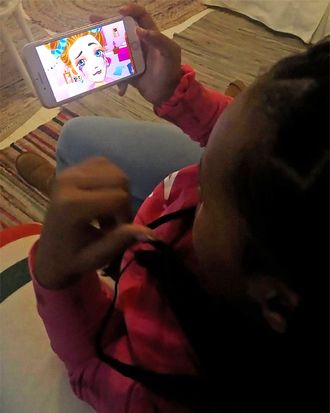
In my house, on evenings when it’s time to unplug from work screens — emails, Zoom calls, and Zoom schooling — I often eat dinner in the TV room while my 10-year-old lets me watch her browse YouTube. Sometimes we watch Unghetto Mathieu, a 21-year-old from Georgia who tests whether people’s diamond jewelry is fake at the Lenox Square Mall in Atlanta. Sometimes it’s Dhar Mann, a 36-year-old filmmaker who makes feel-good short films meant to encourage people to be decent to one another. But the channel with the tightest grip on her right now is Anna Oop, a gossip channel in the tradition of TMZ or The Wendy Williams Show but solely focused on the drama of adolescent TikTokers.
Anna has no face but nearly 2 million subscribers, and she delivers news from behind the image of an animated teenage white girl with two blonde buns and running eyeliner, a shield against potential backlash or doxxing. My daughter first started watching the show last year when it popped up through her algorithm, probably served up between TikTok compilations and Dance Moms reruns.
The flow of the show is perfect for its young audience’s need for constant multimedia stimulation — my daughter’s friends are fans as well, and it gives them something to shoot the shit about while they’re FaceTiming and playing Roblox — though it’s likely the only thing that occupies my daughter enough to watch with her phone down. Every few seconds, Anna’s show flashes from TikTokers’ dances to clips of their IG Live streams to stock footage to viral reaction clips from other parts of the internet. With her unbothered whine of a voice, Anna pulls you into the TikTokers’ world: Tony Lopez is being accused of coercing underage girls into sexual acts, DaBaby is using JoJo Siwa as a punch line in a new song, Charli D’Amelio isn’t crediting Black creators whose dances she copies.
It’s also a perfect primer on how Black culture — more specifically, Black LGBT culture — gets co-opted and repurposed as universal “internet” culture now. Anna Oop’s channel name riffs on Jasmine Masters’s “And I Oop” moment. She delivers the tea mostly associated with young white TikTokers and regularly accentuates her speech with a drawn-out “gurrrrrl.” The first few times I watched the series, I was equally annoyed and troubled: I didn’t want my 10-year-old Black daughter, who has grown up in majority-Black Baltimore her whole life, surrounded by people who culturally affirm her, to be swayed into comparing herself to a curated, lily-white image of what success, visibility, and value looks like for a young person — especially when that success is based on a watered-down version of her own culture.
But because she doesn’t know a world where Black culture is just for Black people, she meets my frustrations with an amused scoff. These bonding moments, when I’m allowed a front seat in her orbit of entertainment, have given me a chance to reflect. When I was around her age, I had a similar curiosity about what was happening in the white world that I didn’t have any real proximity to. MTV News and Howard Stern’s show on E! gave me those voyeuristic opportunities to learn and to be entertained, and even in elementary school, I was clear on this not being much more than something to pass the time. I made the unfair assumption that my daughter doesn’t have the agency to be able to distinguish entertainment from indoctrination.
In a lot of ways, it seems as if Anna Oop is my daughter’s first taste of having something catered just to her interests, something that doesn’t overlap with what I or her other family members are into. But even the things she pays the most attention to these days she treats nonchalantly. So when I ask about her fascination with Anna, my daughter gives an unbothered explanation for her newfound obsession: “Because it’s tea. I don’t really care about the people she’s talking about. The people are always in drama all the time, and it’s funny.”
More From This Series
- Terms of Service: Your Guide to the Lingo of TeaTube
- Glimpsing Behind the Curtain of YouTube’s Anonymous Tea Channels
- Tiffany Ferguson Reacts to Her Video That Won Over the Elusive YouTube Algorithm

